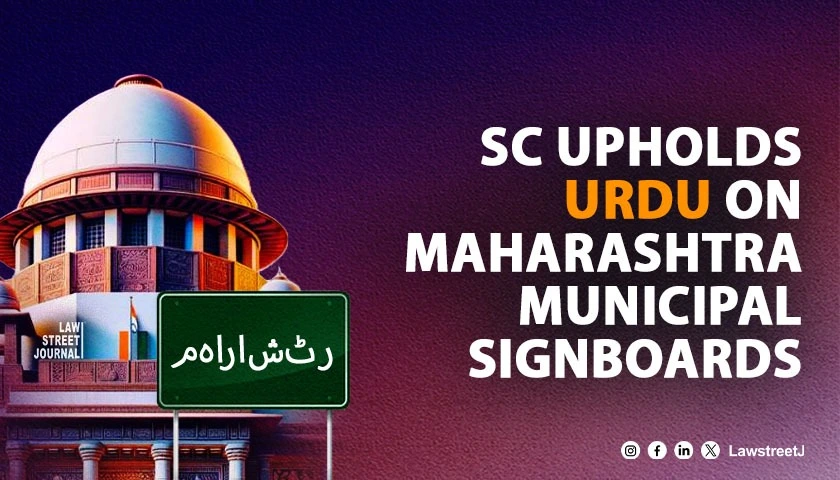New Delhi: The Supreme Court has dismissed a plea challenging the use of Urdu on the signboard of the Patur Municipal Council in Maharashtra, holding that there is no statutory bar to displaying an additional language alongside Marathi.
The Court affirmed that there is no prohibition on the use of Urdu on municipal council signboards in Maharashtra, provided Marathi remains the official language as mandated under the law.
Supreme Court Upholds Urdu on Maharashtra Municipal Signboards
The judgment was delivered by a Bench of Justices Sudhanshu Dhulia and K. Vinod Chandran in the matter of Mrs. Varshatai W/o Sh. Sanjay Bagade vs. State of Maharashtra & Ors.
The case arose when the appellant, a former municipal council member, objected to the inclusion of Urdu on the nameboard of the Patur Municipal Council, Akola District. The signboard displayed the name first in Marathi, followed by its translation in Urdu.
The appellant filed an application under Section 308 of the Maharashtra Municipal Councils, Nagar Panchayats and Industrial Townships Act, 1965 before the Collector, who ruled in favour of the appellant. This order was overturned by the Divisional Commissioner under Section 318 of the same Act. The Bombay High Court subsequently upheld the Divisional Commissioner’s order.
SC Affirms Urdu’s Equal Status with Marathi in Municipal Signage
The appellant contended that under the Maharashtra Local Authorities (Official Languages) Act, 2022, only Marathi could be used in official functions, including signboards. The High Court rejected this argument, stating:
“…all that it does is to ensure that the business and affairs of the Council are to be conducted in Marathi language, including Marathi script… it does not prohibit use of an additional language to display the name, in addition to the name being displayed in Marathi language.”
The Court, further clarifying its stance on the issue of language and religion, observed:
“Language is not religion. Language does not even represent religion. Language belongs to a community, to a region, to people; and not to a religion.”
Highlighting the primary function of language, the Court stated:
“The purpose here for the use of Urdu is merely communication. All the Municipal Council wanted to do was to make an effective communication. This is the primary purpose of a language.”
The Court emphasised India’s linguistic diversity, citing Census data that Urdu is the sixth most spoken scheduled language and is recognised across many Indian states. It clarified that both Marathi and Urdu are listed in the Eighth Schedule of the Constitution and therefore stand on equal constitutional footing. The Court also referred to Article 345 of the Constitution, which allows states to adopt one or more languages in use within the state for official purposes. It also cited the decision in Uttar Pradesh Hindi Sahitya Sammelan v. State of Uttar Pradesh (2014) 9 SCC 716, which upheld the validity of Urdu being declared as a second official language.
While addressing the historical and cultural trajectory of Hindi and Urdu, the Court observed:
“This is not an occasion to have an elaborate discussion on the rise and fall of Urdu, but this much can be stated that this fusion of the two languages—Hindi and Urdu—met a roadblock in the form of the puritans on both sides, and Hindi became more Sanskritized and Urdu more Persian. A schism exploited by the colonial powers in dividing the two languages on religion. Hindi was now understood to be the language of Hindus and Urdu of the Muslims, which is such a pitiable digression from reality; from unity in diversity; and the concept of universal brotherhood.”
The Court further noted that Urdu has a significant presence in the legal vocabulary used in Indian courts, observing:
“Urdu words have a heavy influence on court parlance, both in criminal and civil law. From adalat to halafnama to peshi, the influence of Urdu is writ large in the language of the Indian Courts. For that matter, even though the official language of the Supreme Court and the High Courts, as per Article 348 of the Constitution, is English, yet many Urdu words continue to be used in this Court till date. These include vakalatnama, dasti, etc.”
Considering the present case, the Court held that a Municipal Council’s responsibility is to serve the local community and cater to its diverse needs. It emphasized that language should be used as a medium for communication and unity, rather than division. In this context, the Court found no objection to the use of Urdu alongside Marathi on the signboards of the Municipal Council, especially when a significant portion of the local population speaks Urdu. The Court reaffirmed that language diversity should be embraced as a means of inclusion, ensuring that all residents can engage with municipal services in a language they are familiar with.
Therefore, the Court observed:
“We completely agree with the reasoning given by the High Court that there is no prohibition on the use of Urdu under the 2022 Act or in any provision of law. The entire case of the appellant, to our mind, is based on a misconception of law.”
Accordingly, it dismissed the petition.
Case Title: Mrs. Varshatai W/o Sh. Sanjay Bagade vs. State of Maharashtra & Ors.











